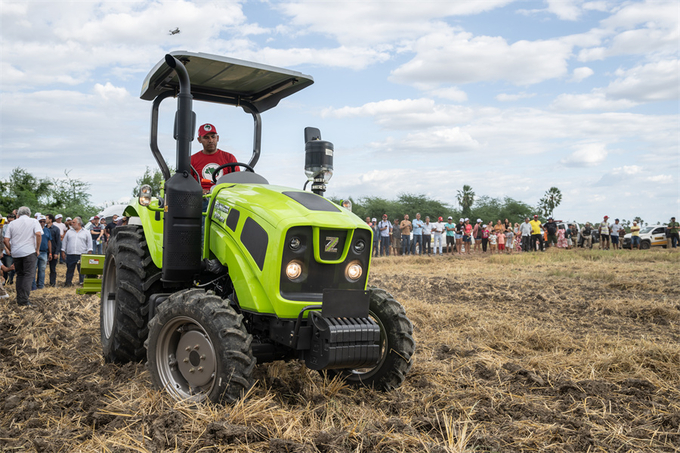December 31, 2025 | 17:07 GMT +7
December 31, 2025 | 17:07 GMT +7
Hotline: 0913.378.918
December 31, 2025 | 17:07 GMT +7
Hotline: 0913.378.918

People watch a Chinese-made tractor in action in Apodi in the state of Rio Grande do Norte, Brazil, in February. As part of the agricultural mechanization cooperation between the two countries, a total of 31 sets of equipment have been delivered to the Brazilian side. Photo: Xinhua.
China has underlined the importance of the role of smallholder farming as G20 members gather to address the global hunger and poverty crisis that's been worsened by climate change, conflicts and trade barriers.
That was the message sent out by Vice-Minister of Agriculture and Rural Affairs Ma Youxiang at the G20 meeting of agricultural ministers held in Cuiaba, Brazil, in September.
Smallholder farming — a major source of livelihood for millions of people worldwide — is foundational to China's sprawling agricultural sector.
According to an agricultural census in 2016, small-scale farmers in China account for over 98 percent of agricultural operating entities, with an average plot of about 0.52 of a hectare per household.
Drawing inspiration from the nation's success in prioritizing the group in its fight against rural poverty and ensuring food security, he told a mix of agricultural officials and representatives from international organizations, including the World Bank, that the Chinese government has worked to empower these farmers with technologies, help build their capacity, and offer financial support — all aimed at enabling their integration with modern agriculture.
To make food production more efficient, the vice-minister proposed accelerating the development of agricultural machinery and equipment tailor-made for smallholder farmers and improving the social services they need.
He also recommended extending food production's value chain to boost rural income and enhance farming resilience.
"We shall make sure that no smallholder farmer is left behind," he said, adding that such efforts contribute to the United Nations'2030 Sustainable Development Goals of poverty reduction and eradicating hunger.
According to the UN Food and Agriculture Organization, smallholder famers, or family farmers, operate more than 90 percent of the world's farms, covering 70 to 80 percent of the global agricultural land area, and their food production value accounts for more than 80 percent of the world's total.
Supporting smallholder farmers, for instance, by nurturing rural industrial clusters and integrating them into the production of agricultural products with higher added value, has aided poverty reduction and sustainable rural development, as demonstrated by Chinese practices.
The Ministry of Agriculture and Rural Affairs reported that 60 percent of central government funding allocated for rural vitalization initiatives was directed toward advancing rural industries. Three-quarters of farmers who have recently been lifted out of poverty are intricately engaged in the extended rural supply chain.
Support measures aimed at farmers have bolstered national food security through various initiatives. These include subsidies for specific crop cultivation and the implementation of a minimum purchase price policy for grains. Under this policy, the government or relevant authorities commit to purchasing grains from farmers or traders at a set price.
Additionally, the government dispatches technical teams to assist farmers during extreme weather events and outbreaks of pests and plant diseases.
Those efforts have in part helped China to further boost its food production capacity despite major food-producing areas being buffeted by typhoons and other extreme weather conditions earlier this year.
In late October, Vice-Minister of Agriculture and Rural Affairs Zhang Xingwang told a news conference in Beijing that China is on track to surpass 700 million metric tons in grain yield for the first time this year, after maintaining a figure above 650 million tons for nine consecutive years.
At a news conference on World Food Day, which has been celebrated annually on Oct 16 since 1981 to raise awareness and promote action for fighting hunger and ensuring food security for all, Foreign Ministry spokeswoman Mao Ning said China has managed to feed its 1.4 billion people despite having just a quarter of the world's arable land.
As the world's largest food producer, China also attaches great importance to global food security.
The country has provided more funding and experts and undertaken more projects than any other developing country under the framework of the Food and Agriculture Organization's South-South Cooperation Programme, she said.
Mao reiterated the nation's commitment to more global cooperation on food security and to create a world free of hunger.
(Chinadaily)

(VAN) From emissions cuts to energy sovereignty, France’s president reflects on COP21's legacy.

(VAN) A Yale University poll from earlier this month says most Americans see climate change as playing a role in hurting prices and the cost of living.

(VAN) According to the National Food and Strategic Reserves Administration, this year's autumn grain entered the market earlier and boasts good quality.

(VAN) The Trade Policy and Strategy Office (TPSO) under the Commerce Ministry reported that exports in November 2025 were worth US$27.445 billion, expanding for a 17th consecutive month at 7.1%.

(VAN) Ukraine’s leading poultry processor and exporter, MHP, plans to kick off a trial production of insect meal in the first quarter of 2026, as revealed by Serhiy Melnychuk, scientific advisor to the chairman of MHP.

(VAN) Researchers have warned of the unexpected consequences of extremely hot, humid conditions during pregnancy.

(VAN) A group of Iranian scientists from the National Institute of Genetic Engineering and Biotechnology claimed that they have developed a technology that allows effective processing of poultry feathers into meal using a Bacillus strain.